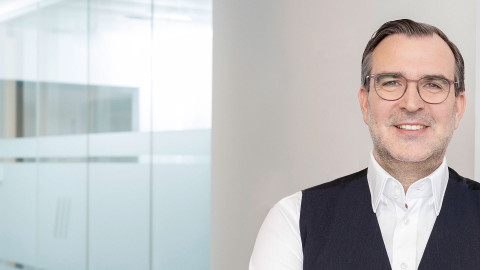hkp/// group experts Petra Knab-Hägele and Michael H. Kramarsch in conversation with hkp.com about the flexible conversion of bonus payments and solidarity-based contributions to employee stock options or alternative forms of ownership.
Ms. Knab-Hägele, Mr. Kramarsch, you suggest converting bonus payments and solidarity-based contributions to employee ownership offerings. What is the background to this?
Petra Knab-Hägele: Converting bonus payments and also solidarity-based contributions, such as salary cuts, lower future pay rises etc. is one way of addressing major concerns of both employers and employees in the current crisis — a solution we have already successfully implemented in practice.
Michael H. Kramarsch: The merits of this solution are clear to see. All parties benefit from employee ownership. So does society as a whole because it helps to reverse the current imbalance of wealth distribution in this country.
How do you see the current situation affecting your clients?
Petra Knab-Hägele: The top priority is safeguarding liquidity in order to ensure the survival of the enterprise. Companies are closing production facilities and branches, demand for their products and services is collapsing, and firms are using every weapon in their armory, such as reducing working hours, short time-work, compulsory leave, and are not raising salaries as normal. As well as keeping their workforce healthy, they aim to maintain their production and delivery capabilities for the economic upturn after the crisis. That also includes careful management of redundancies.
How exactly would you summarize the benefit of converting bonus payments and solidarity-based contributions for the different stakeholders?
Michael H. Kramarsch: In these times, safeguarding liquidity is key. The latest bonus payments in particular are exacerbating the difficult liquidity position because most of them relate to last year, and that was generally very successful. These bonuses are therefore high.
Regulators in some sectors are calling for prudence when it comes to bonus payments...
Petra Knab-Hägele: For instance, in line with the EU regulatory and supervisory and the international standard setting bodies, the German BAFIN recommends that banks and financial service providers refrain from share buybacks and, given the high degree of uncertainty about future developments, carefully think about dividend and bonus payments.
But haven’t most bonuses already been paid?
Petra Knab-Hägele: That is only partly true. Around three quarters of the major companies pay bonuses in Q2, and we are talking about more than just bonus payments.
So, what are the other options?
Michael H. Kramarsch: Conversion to employee ownership can also be applied to any solidarity-based contributions that are yet to be negotiated in view of the crisis. I’m thinking of pay cuts and also of sacrificing any pay rises that would be due. Converting these solidarity-based contributions into company shares, either in whole or in part, would ease the pressure on liquidity. But other than by simply postponing any pay rises, it would give employees a stake in working towards recovering lost value so that they will be compensated disproportionately at a later stage.
But not every employee can or will forgo their bonus payment...
Petra Knab-Hägele: ...especially in the current circumstances. Basically, firms only have the option to make individual offers for any variable pay already earned. The situation is different with solidarity-based contributions because they are forward-looking and are usually negotiated as part of collective agreements. In this context, employee ownership can be proactively offered as smart (part) compensation for whatever kind of pay sacrifice staff are making.
Without getting too technical; what could such a scheme look like?
Petra Knab-Hägele: Every business must find its own way within the constraints of the relevant rules and regulations. But the following scenario could be a solution: Employees are entitled to receive shares in three years’ time. Although these rights are vested, the shares are not yet at the disposal of the beneficiaries. However, they do participate in the share performance from day one. An alternative could be issuing phantom stock or appreciation rights for part of the compensation package. The beneficiaries would receive more stock appreciation rights than shares, which would give them much greater leverage when share prices rise. Once the crisis is over and the positive liquidity effect has done its job, parties can work out in detail whether any gains should be settled in cash or shares.
Are there any other ways of compensating employees for the solidarity-based contributions we mentioned earlier, or are stock options the only way?
Petra Knab-Hägele: Of course, there are other solutions. Simply deferring salary payments over three years with interest, contingent on a positive business performance, is one of them. So would be conversion into loans or profit participation rights.
What exactly are the merits of employee ownership?
Michael H. Kramarsch: The benefits are obvious: Employee stock options create a stable ownership base at favorable entry prices that makes takeovers by activist investors, hedge funds etc. more difficult, which are not that unlikely at times of crisis. And then there are the usual benefits of employee share ownership: a long-term oriented, highly motivated workforce and the loyalty of experts who are key to the firm’s success. The latter will be particularly in demand during the recovery phase.
What about the employees’ risk exposure?
Petra Knab-Hägele: This entire crisis is one huge risk and its eventual dimensions can’t even be assessed at this moment. Our society, businesses and workers all have to make a joint effort to overcome it. Short-time work, debt instrument guarantees etc. are Government support measures. Offering employee ownership options gives businesses the opportunity to couple the solidarity-based contributions that will probably be asked of their workers with a chance they would not get otherwise.
Michael H. Kramarsch: We are all convinced that there will be a recovery and should hang on to this vision. It is not without risk, but there is no way forward without risk.
Stock corporations generally find it easier to contemplate employee share ownership. Do you include other types of business structure in your thoughts on converting solidarity-based contributions into shares?
Petra Knab-Hägele: Companies that are not stock based are also able to offer their workforce this kind of conversion, for instance by virtual forms of ownership such as profit participation and stock appreciation rights, or loans and interest-bearing pay deferrals discussed earlier. These kind of businesses also can employ those measures to safeguard liquidity and give their employees the opportunity to benefit from a good performance.
How open are companies to the idea of converting their workers’ solidarity-based contributions into ownership?
Michael H. Kramarsch: There is quite a lot of interest, which is not really surprising. Every single enterprise is currently looking for ways and means to weather this crisis as best as they can. This is just one measure though, but it is a very effective one in many respects.
Ms. Knab-Hägele, Mr. Kramarsch, thank you very much for talking to us.




